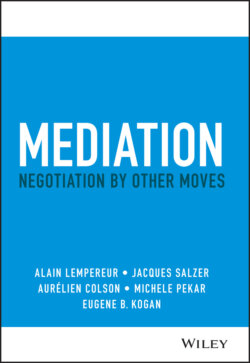Читать книгу Mediation - Alain Lempereur - Страница 9
Conflict
ОглавлениеConflict is an inevitable dimension of life. First, we all experience inner conflicts between antagonistic aspirations of different parts of our identity. Second, when we bring together groups of individuals, tensions may arise for many reasons: clashes of values and norms, resource allocation, definition or interpretation of rules, reward and sanction mechanisms, etc. Many causes trigger a conflict, which can deepen over time.
On the positive side, conflict is creative; it helps reveal how obsolete or unfair certain social arrangements might be. It expresses frustration in the face of perceived or experienced injustice, prolonged oppression, and denial of identity. Conflict provokes new questioning, shakes up established routines, inefficient returns, and can spur innovation. American civil rights activist Septima Poinsette Clark (1898–1987) has remarked: “I have great belief in the fact that whenever there is chaos, it creates wonderful thinking. I consider chaos a gift.” Conflict is the engine at the heart of “creative destruction” theorized by economist Joseph Schumpeter (1942). This is the bright side of conflict.
But, on the other hand, conflict is also destructive. Waged among groups – countries, organizations, businesses – and individuals, conflict endangers solidarity, cooperation, and mutual exchange; and thrives on selfishness, competition, and self‐righteousness. Conflict often generates aggression and inflicts suffering. It has a built‐in escalation dynamic – whoever is blamed first is provoked to retaliate, feeding a new assault of greater intensity that causes an even more massive counterattack, and so forth. Each side often looks to dominate and crush the other, while imposing their solution. As damages and victims accumulate, relationships shatter, identities are denied, time is lost, and resources are squandered. Conflict takes a deep emotional toll (e.g. sadness, anger, suffering) and inflicts significant material damages (e.g. wasted resources, property destruction). In the sphere of armed conflict, an even more detrimental result of conflict is the violation of human integrity and dignity (e.g. injuries, rape, death, massacre, and genocide).
This ambivalent reality of conflict – a powerful engine of change, but also an agent of destruction – creates concerns that all human societies address: how to manage conflicts? How to prevent them, mitigate them, resolve them, and even transform them? And who should intervene? This brings us to our next point.
